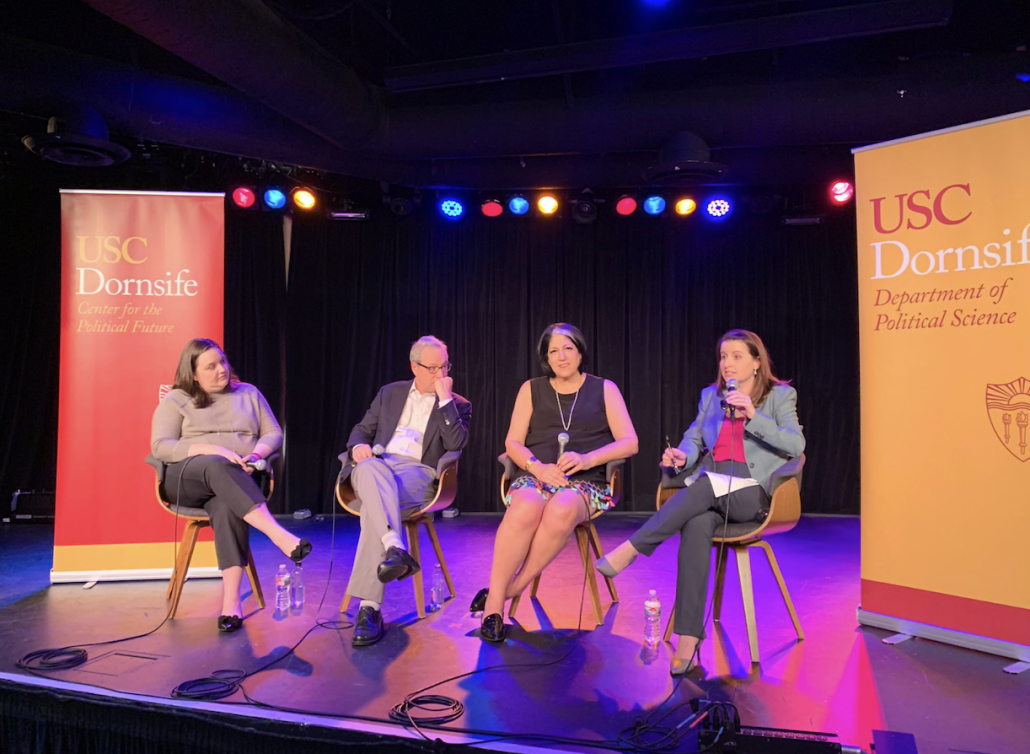Journalists discuss role of media in politics

( Photo from Twitter/@USCPolFuture)
Journalists Tammy Haddad, Ron Brownstein and Colleen King spoke about media coverage and the role of journalists in the 2020 elections at Ground Zero Tuesday.
Center for the Political Future Director Bob Shrum introduced each of the panelists and Annenberg Media Center Director Christina Bellantoni moderated the discussion. The event was co-hosted by the Center for the Political Future and the Department of Political Science and International Relations as part of the Center’s “Political Conversations” series.
Haddad is the President and CEO of Haddad Media, and formerly served as an executive producer at MSNBC, the Today Show and The Late Late Show. Brownstein is a senior editor at The Atlantic and a senior political analyst at CNN. King is an executive producer at MSNBC.
Bellantoni opened the discussion by asking the panel how media coverage has shaped political discourse since the Democratic Debates on Sept. 12. Haddad and King, who have worked together in producing broadcast television, concurred that editorial choices and the immediacy of media today shape audience’s views about certain candidates and platforms.
“There is a real schism in the reaction to [the debates], based on when the reactions were formulated,” Brownstein said. “People often start writing before the end.”
In the case of the most recent debate, the candidates said that Democratic candidate Julián Castro attacked candidate Joe Biden for his age, and because of the coverage of that incident, Biden’s later assent went by unnoticed.
“I also think there’s so much microtargeting going on in the campaigns,” Haddad said. “So if you’re a regular person, a regular viewer and you’re trying to figure out what’s going on — it’s too narrow. It doesn’t work.”
The panel also discussed how the abundance of information has made it harder for people to choose a candidate.
Haddad took a moment to survey the audience and asking who is settled on a candidate. Only one hand was raised. The conversation then shifted to how candidates are covered and how this affects voting attitudes.
“In Washington, if you’ve covered foreign policy, or you’ve covered Capitol Hill or you’ve covered the White House, you’ve come across Biden,” King said. “He is very accessible and very friendly, so I think we’ve all met him and know him. But I think, at the same time, you look at him more closely because you remember more than you would know about a newer, up-and-coming candidate.”
The panelists discussed how Elizabeth Warren has emerged as popular candidate among young, college-educated voters and how some voices speculate that Hillary Clinton might make an appearance at the Democratic National Convention and announce a run for the presidency.
The panelists all agreed that media coverage is so much more abundant and accessible today, and this has changed how voters make their decisions, when they make their decisions and how it affects the length of the entire presidential election process.
“Because there is more money available — it’s essentially infinite — and because there’s more media attention available — it’s essentially infinite — we are seeing races go all the way to the end, in a way that was not common before,” Brownstein said.
Julianna Montano, a freshman majoring in philosophy, politics and law, has attended several of the Center’s events and found this panel to be different but equally engaging.
“It was definitely a much different experience because it was an open forum, there was a moderator,” Montano said. “You have less chances to be part of the dialogue, however, I feel that it is such an organized event, it leaves you more room to listen and enjoy learning from professionals in their respective fields.”

